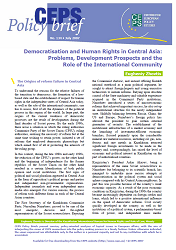№134. Democratisation and Human Rights in Central Asia: Problems, Development Prospects and the Role of the International Community
№134. Democratisation and Human Rights in Central Asia: Problems, Development Prospects and the Role of the International Community
Author(s): Eugheniy Zhovtis
Subject(s): Geography, Regional studies, Human Rights and Humanitarian Law, International relations/trade, Social development, Economic development
Published by: CEPS Centre for European Policy Studies
Keywords: Central Asia; Democratisation; Human Rights; international community; CPSU;
Summary/Abstract: To understand the reasons for the relative failures of the transition to democracy, the formation of a law-based state and the establishment of respect for human rights in the independent states of Central Asia today, as well as the role of the international community, one has to assess, first of all, the dynamics of the political process in this region of the world. In large part, the origins of the current weakness of democratic processes are the result of developments during the final decades of Soviet power. By the early 1990s, there arose a situation in which the ruling authorities Communist Party of the Soviet Union (CPSU), ruling authorities, realising the necessity of reform but at the same time wishing to retain power, initiated a set of reforms that employed democratic phraseology but which aimed first of all at protecting the interests of the ruling group.
Series: CEPS Policy Briefs
- Page Count: 12
- Publication Year: 2007
- Language: English
- Content File-PDF

